八年级下册英语知识点归纳
- 格式:docx
- 大小:26.84 KB
- 文档页数:17
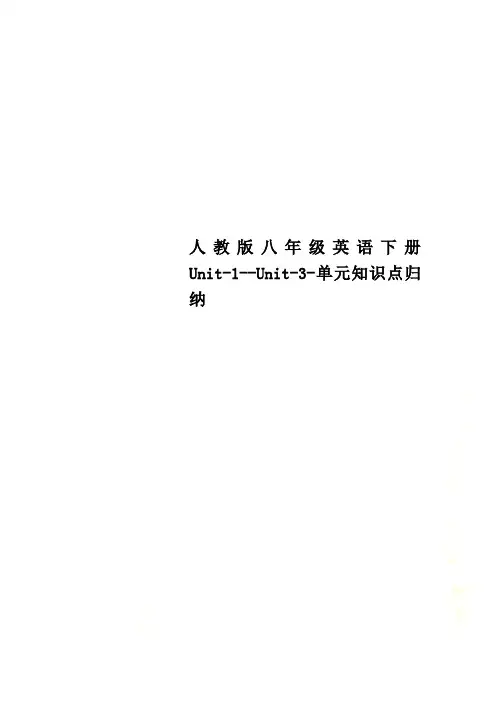
人教版八年级英语下册Unit-1--Unit-3-单元知识点归纳free【动词】使……解脱,得到自由He could not free his arm.free from21. run out用完,用尽 When his water run out, he knew that he would have to do something to save his own life.物sth. tun out. 某物用尽了。
人sb. run out of物sth..人用尽了某物。
He run out of all his money last night.22.risk sth to do sth. 冒着...的风险去做某事 take a risk=take risks 冒险risk doing ...=take the risk of doing ...23. the importance of (doing) sth.(做)某事的重要性 We students should know the importance of (learning) English.importance n. 重要(性), important adj.重要的,unimportant adj.24.decision 【名词】决定;抉择; make a decision to do sth.decide25. be in the control of …掌管,管理 The headmaster is in the control of this new school. be out of control无法控制,无法管理 be under control被控制住,在控制之中26. 【复习】mind意为介意,Would you mind my opening the window?27. give up (doing) sth. 放弃(做)某事,give up (playing) computer games;give up后可接名词、代词和动词ing形式,也可不接,如 Never give up easily.II. 重点短语1. have a fever 发烧2. have a cough 咳嗽3. have a toothache 牙疼4. talk too much 说得太多5. drink enough water 喝足够的水6. have a cold 受凉;感冒7. have a stomachache 胃疼8. have a sore back 背疼9. have a sore throat 喉咙痛10. lie down and rest 躺下来休息11. hot tea w ith honey 加蜂蜜的热茶12. see a dentist 看牙医13. get an X-ray 拍X 光片14. take one’ s temperature量体温15. put some medicine on sth. 在……上面敷药16. feel very hot 感到很热17. sound like 听起来像18. all weekend 整个周末19. in the same way 以同样的方式20. go to a doctor 看医生21. go along 沿着……走22. on the side of the road 在马路边23. shout for help 大声呼救24. without thinking twice 没有多想25. get off 下车26. have a heart problem 有心脏病27. to one’ s surprise使....... 惊讶的28. thanks to 多亏了;由于29. in time 及时30. save a/one’s life挽救生命lose one's life 31. get into trouble 造成麻烦32. right away 立刻;马上33. because of 由于34. get out of 离开;从……出萍35. hurt oneself 受伤36. put a bandage on sth. 用绷带包扎37. fa ll down 摔倒38. feel sick 感到恶心39. have a nosebleed 流鼻血40. cut his knee 割伤他的膝盖41. put her head back 把她的头向后仰42. have problems breathing 呼吸困难43. mountain climbing 登山运动44. be used to doing sth. 习惯做某事45. run out (of) 用完;用尽46. so that 以便47. so. . . that 如此… …以至于…48. be in control of 掌管;管理49. in a difficult situation 在闲境屮50. keep on doing sth. 继续或坚持做某事51. make a decision 做出决定52. take risks 冒险53. give up 放弃III. 重点语法【反身代词】英语中共有八个反身代词,在使用时应注意和它所指的相应的对象在人称、性别、数上保持一致。
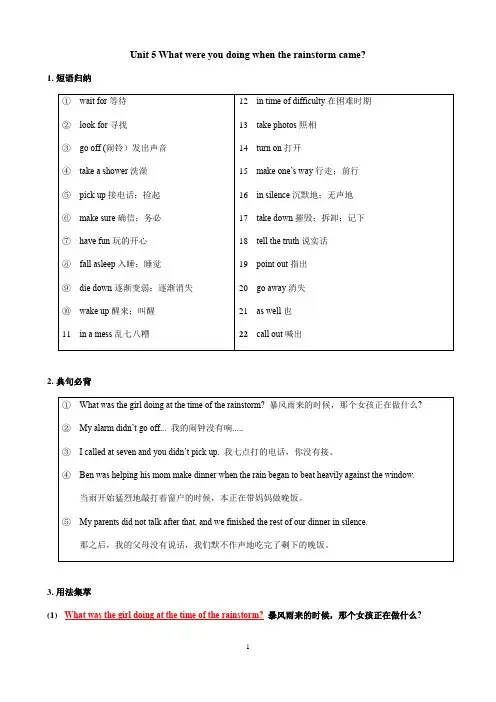
Unit 5 What were you doing when the rainstorm came?1.短语归纳2.典句必背3.用法集萃(1)What was the girl doing at the time of the rainstorm?暴风雨来的时候,那个女孩正在做什么?❖本句是特殊疑问句,时态是过去进行时,结构是“What+was/were+主语+doing+其他?”,用于询问某人在过去的某个时间正在做的事情。
例:—What were you doing at nine o’clock yesterday evening? 昨天晚上九点你正在做什么?—I was watching TV at home. 我正在家里看电视。
❖拓展:过去进行时描述过去某个时刻正在发生的动作或存在的状态,结构是“was/ were+动词的现在分词”。
例:When I got home my mother was cooking. 我到家的时候我妈妈正在做饭(2)My alarm didn’t go off... 我的闹钟没有响.....❖go off意为“(闹钟)发出响声”例:My alarm goes off at six every morning. 我的闹钟每天早晨6点响。
❖归纳:go off还有“离开”和“变质”之意。
例:Bob went off to get a drink. 鲍勃拿饮料去了。
Meat goes off quickly in hot weather. 热天肉变质得快。
❖拓展:go的短语(3)I called at seven and you didn’t pick up. 我七点打的电话,你没有接。
❖pick up意为“接电话”。
pick up有如下含义:(4)I called again at eight and you didn’t answer then either. 我八点再打来,你也没接。
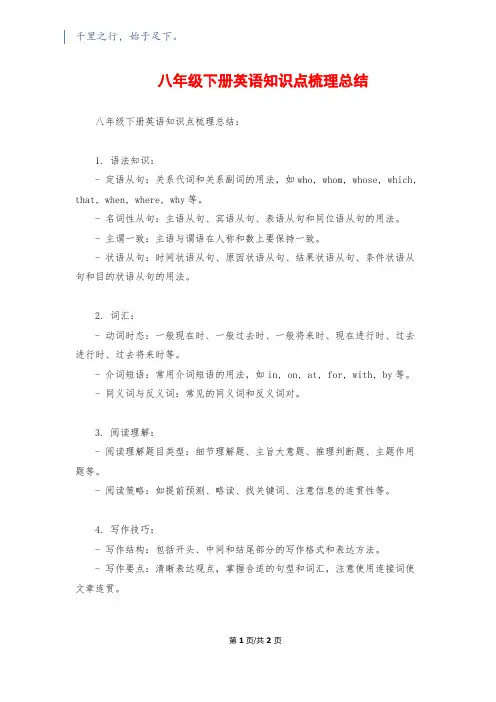
千里之行,始于足下。
八年级下册英语知识点梳理总结
八年级下册英语知识点梳理总结:
1. 语法知识:
- 定语从句:关系代词和关系副词的用法,如who, whom, whose, which, that, when, where, why等。
- 名词性从句:主语从句、宾语从句、表语从句和同位语从句的用法。
- 主谓一致:主语与谓语在人称和数上要保持一致。
- 状语从句:时间状语从句、原因状语从句、结果状语从句、条件状语从句和目的状语从句的用法。
2. 词汇:
- 动词时态:一般现在时、一般过去时、一般将来时、现在进行时、过去进行时、过去将来时等。
- 介词短语:常用介词短语的用法,如in, on, at, for, with, by等。
- 同义词与反义词:常见的同义词和反义词对。
3. 阅读理解:
- 阅读理解题目类型:细节理解题、主旨大意题、推理判断题、主题作用题等。
- 阅读策略:如提前预测、略读、找关键词、注意信息的连贯性等。
4. 写作技巧:
- 写作结构:包括开头、中间和结尾部分的写作格式和表达方法。
- 写作要点:清晰表达观点,掌握合适的句型和词汇,注意使用连接词使文章连贯。
第1页/共2页
锲而不舍,金石可镂。
5. 口语表达:
- 问答方式:疑问句、选择疑问句等。
- 求助方式:请求帮助、征求意见等口语表达方式。
这些是八年级下册英语的主要知识点梳理总结,希望对你有帮助!。

Unti1 what’s the matter?短语归纳1.too much 太多2.lie down 躺下3.get an X-ray 做个X光检查4.take one ’s temperature 量体温5.put some medicine on ......在....上敷药6.have a fever 发烧7.take breaks /take a break 休息8.without thinking twice 没多想9.get off 下车10.take sb to the hospital 送某人去医院11.wait for等待12.to one’s surprise 使.......惊讶的13.thanks to多亏于;由于14.in time及时15.think about 考虑16.have a heart problem患有心脏病17.get into the trouble 遇到麻烦18.do the right thing做正确的事情事情19.fall down 摔倒20.put ...... on sth把...放在某物上21.get hit/sunburned 摔伤/烧伤22.be interested in 对.....感兴趣23.be used to 习惯于.... 24.take risks/take a risk 挑战25.lose one’s life 失去生命26.because of 因为27.run out of 用完28.cut off 切除29.get out of 从...出来30.make a decision/decisions 做决定31.be in control of 掌管;管理用法归纳1.need to do sth .需要去做某事2.see sb doing sth 看见某人正在做某事3.ask sb sth 询问某人某事4.expect sb to do sth 期望某人做某事5.agree to do sth 想要做某事6.help sb (to) do sth 帮助某人做某事7.want to do sth 想要做某事8.tell sb to do sth 告诉某人做某事9.have problems/trouble (in) doing sth 做某事有困难e sth to do sth用某物去做某事11.be/get used to doing sth 习惯于做某事12.seem to do sth 好像做某事13.keep on doing sth 继续做某事14.mind doing sth 介意做某事15. give up doing sth 放弃做某事语法点1.询问某人的健康问题及遇到麻烦的表达方法2.情态动词should的用法表示劝告与建议,也表义务与责任3.不定代词的用法4.反身代词的用法精细解读1. What’s the matter (with you)? 怎么了?出什么事了?What’s the trouble/ the problem / wrong with sb./ sth.? What’s up?2. I had a cold.我感冒了。
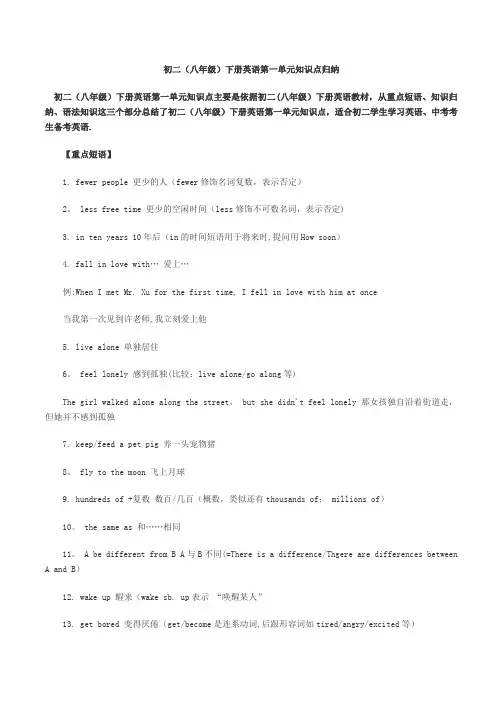
初二(八年级)下册英语第一单元知识点归纳初二(八年级)下册英语第一单元知识点主要是依据初二(八年级)下册英语教材,从重点短语、知识归纳、语法知识这三个部分总结了初二(八年级)下册英语第一单元知识点,适合初二学生学习英语、中考考生备考英语.【重点短语】1. fewer people 更少的人(fewer修饰名词复数,表示否定)2。
less free time 更少的空闲时间(less修饰不可数名词,表示否定)3. in ten years 10年后(in的时间短语用于将来时,提问用How soon)4. fall in love with…爱上…例:When I met Mr. Xu for the first time, I fell in love with him at once当我第一次见到许老师,我立刻爱上他5. live alone 单独居住6。
feel lonely 感到孤独(比较:live alone/go along等)The girl walked alone along the street, but she didn't feel lonely那女孩独自沿着街道走,但她并不感到孤独7. keep/feed a pet pig 养一头宠物猪8。
fly to the moon 飞上月球9. hundreds of +复数数百/几百(概数,类似还有thousands of; millions of)10。
the same as 和……相同11。
A be different from B A与B不同(=There is a difference/Thgere are differences between A and B)12. wake up 醒来(wake sb. up表示“唤醒某人”13. get bored 变得厌倦(get/become是连系动词,后跟形容词如tired/angry/excited等)14. go skating 去滑冰(类似还有go hiking/fishing /skating/bike riding等)15. lots of/a lot of 许多(修饰可数名词、不可数名词都可以)16。
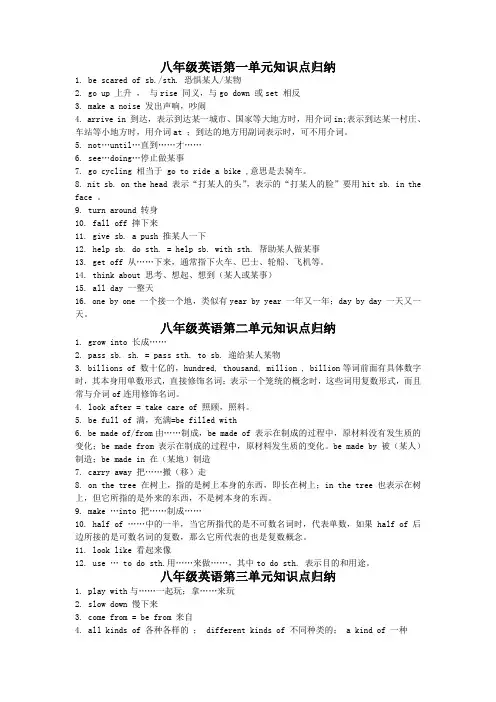
八年级英语第一单元知识点归纳1. be scared of sb./sth. 恐惧某人/某物2. go up 上升,与rise 同义,与go down 或set 相反3. make a noise 发出声响,吵闹4. arrive in 到达,表示到达某一城市、国家等大地方时,用介词in;表示到达某一村庄、车站等小地方时,用介词at ;到达的地方用副词表示时,可不用介词。
5. not…until…直到……才……6. see…doing…停止做某事7. go cycling 相当于 go to ride a bike ,意思是去骑车。
8. nit sb. on the head 表示“打某人的头”,表示的“打某人的脸”要用hit sb. in the face 。
9. turn around 转身10. fall off 摔下来11. give sb. a push 推某人一下12. help sb. do sth. = help sb. with sth. 帮助某人做某事13. get off 从……下来,通常指下火车、巴士、轮船、飞机等。
14. think about 思考、想起、想到(某人或某事)15. all day 一整天16. one by one 一个接一个地,类似有year by year 一年又一年;day by day 一天又一天。
八年级英语第二单元知识点归纳1. grow into 长成……2. pass sb. sh. = pass sth. to sb. 递给某人某物3. billions of 数十亿的,hundred, thousand, million , billion等词前面有具体数字时,其本身用单数形式,直接修饰名词;表示一个笼统的概念时,这些词用复数形式,而且常与介词of连用修饰名词。
4. look after = take care of 照顾,照料。
5. be full of 满,充满=be filled with6. be made of/from由……制成,be made of 表示在制成的过程中,原材料没有发生质的变化;be made from 表示在制成的过程中,原材料发生质的变化。
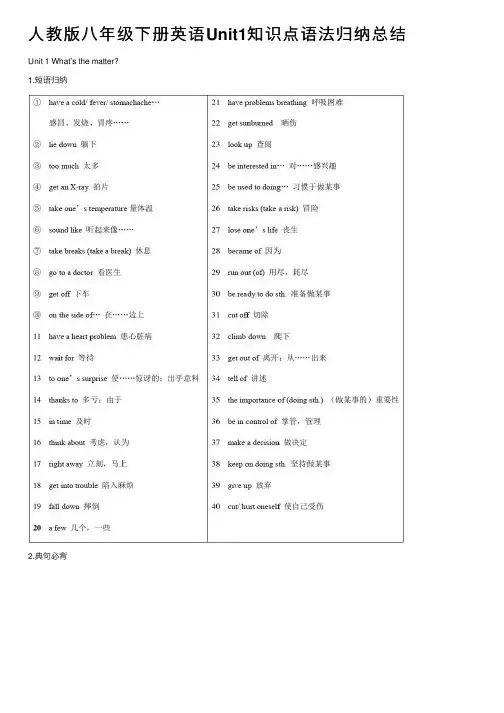
⼈教版⼋年级下册英语Unit1知识点语法归纳总结Unit 1 What’s the matter?1.短语归纳2.典句必背3.⽤法集萃(1)当别⼈⼼情不好,⾝体不适或遇到⿇烦时,我们可以⽤如下表达表⽰关⼼:?What’s the matter? What’s the matter with youWhat’s wrong with …What’s the trouble\problem with …(2)英语中常⽤have描述⾝体的不适,此时have意为“患有”,常⽤结构:①have a + 疾病例:have a cold 感冒;have a fever 发烧;have a cough 咳嗽②have a + ⾝体部位-ache例:have a headache 头痛;have a toothache ⽛痛③have a sore + ⾝体部位例:have a sore throat 咽喉痛;have a sore back 背痛(3)lie down躺下;tell lies/a lie 说谎(4)maybe & may be①maybe,“或许”,常⽤于句⾸,表⽰可能性,后加句⼦。
例:Maybe you are right.②may be,是情态动词+be的结构,意为“可能,也许”,后加名词、代词或形容词。
例:He may be angry.(5)sound like & sound①sound like+名词/代词/从句例:It sounds like you don’t know the truth. It sounds like a good idea.②sound+形容词,“听起来,好像”,例:The music sounds nice.(6)…when the driver saw an old man lying on the side of the road. ……这时司机看到意为⽼⼈躺在路边。
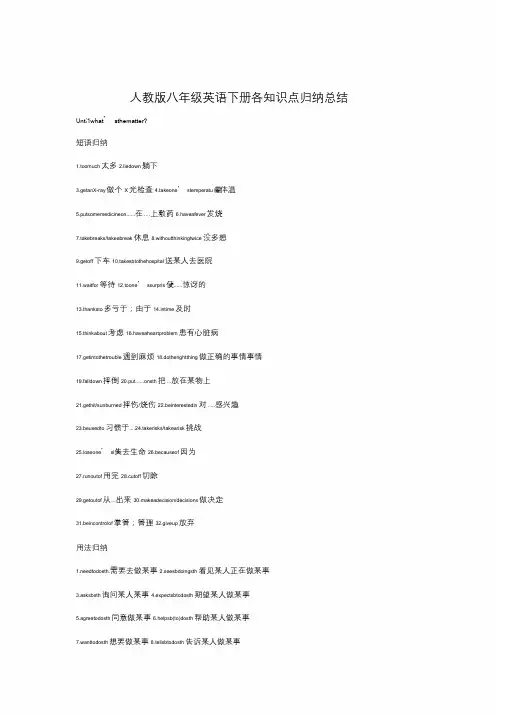
人教版八年级英语下册各知识点归纳总结Unti1what’sthematter?短语归纳1.toomuch太多2.liedown躺下3.getanX-ray做个X光检查4.takeone’stemperatu量r e体温5.putsomemedicineon......在....上敷药6.haveafever发烧7.takebreaks/takeabreak休息8.withoutthinkingtwice没多想9.getoff下车10.takesbtothehospital送某人去医院11.waitfor等待12.toone’ssurpris使e.......惊讶的13.thanksto多亏于;由于14.intime及时15.thinkabout考虑16.haveaheartproblem患有心脏病17.getintothetrouble遇到麻烦18.dotherightthing做正确的事情事情19.falldown摔倒20.put......onsth把...放在某物上21.gethit/sunburned摔伤/烧伤22.beinterestedin对.....感兴趣23.beusedto习惯于....24.takerisks/takearisk挑战25.loseone’sl失ife去生命26.becauseof因为27.runoutof用完28.cutoff切除29.getoutof从...出来30.makeadecision/decisions做决定31.beincontrolof掌管;管理32.giveup放弃用法归纳1.needtodosth.需要去做某事2.seesbdoingsth看见某人正在做某事3.asksbsth询问某人某事4.expectsbtodosth期望某人做某事5.agreetodosth同意做某事6.helpsb(to)dosth帮助某人做某事7.wanttodosth想要做某事8.tellsbtodosth告诉某人做某事9.haveproblems(in)doingsth做某事有困难esthtodosth用某物去做某事11.be/getusedtodoingsth习惯于做某事12.seemtodosth好似做某事13.keepondoingsth继续做某事14.minddoingsth介意做某事语法点1.询问某人的XX问题及遇到麻烦的表达方法2.情态动词should的用法3.不定代词的用法精细解读1.What’sthematter(withyou)?怎么了?出什么事了?What’s thetrouble/theproblem/wrongwithsb./sth.?2.Ihadacold.我感冒了。

(一)知识点Unit1 what' s the matter?1. It’s +形容词+ for sb. + to do sth. 做某事对某人来说是…的。
It’s important to do sth. 做某事很重要。
It’s important for me to eat a balanced diet. 平衡饮食对我来说是很重要的.It’s easy to do sth. 做某事是容易的。
It’s easy for us to find out the answer. 找出答案对我们来说是容易的2. 情态动词should的用法should是情态动词,它的基本用法是必须和其他动词一起构成谓语。
意为"应该......"。
should(应当,应该)用于所有人称,表示劝告或建议。
eg. ---I have a very bad cold. 我感冒很厉害。
---You should lie down and have a rest. 你应该躺下,多喝水。
3. maybe与may be(1)maybe是副词,译为“也许、可能”,相当于“perhaps”。
如:Maybe he can answer the question. 也许他能回答那个问题。
He maybe is from the USA, too. 他可能也来自美国。
(2)may be中的may为情态动词,译为“可能是......”。
如:He may be from the USA, too. 他可能也来自美国。
She may be our English teacher. 她可能是我们的英语老师。
4. few、a few、little、a little的区别和联系:(1)few / a few用来修饰可数名词,few表示否定意义,没有,几乎没有;a few表示肯定意义,有几个。
例如:He has few friends here, he feels lonely. 他这里没朋友,他感觉寂寞。

八年级英语下册各单元知识点归纳Unit 1: The Present and Future1. Present Simple Tense- Used for general facts, habits, and routines.- Form: subject + verb (base form) + object.Examples:- Dogs bark. (general fact)- She brushes her teeth before bed. (habit)- The sun rises in the east. (routine)2. Present Continuous Tense- Used for actions happening at the moment of speaking.- Form: subject + be verb (am/is/are) + verb (-ing) + object. Examples:- I am studying for my exams right now.- They are playing football in the park.- She is talking on the phone.3. Future Simple Tense- Used for actions or events in the future.- Form: subject + will + base form of the verb + object.Examples:- I will visit my grandparents next week.- They will go to the cinema tomorrow.- He will start a new job next month.Unit 2: My Day1. Daily Routines- Expressions used to talk about daily activities.- Example phrases: get up, have breakfast, go to school, do homework, go to bed.Examples:- I usually get up at 7 am.- She has breakfast at 8 am every day.- We go to bed at 10 pm.2. Adverbs of Frequency- Words used to express how often something happens.- Examples: always, often, sometimes, rarely, never.Examples:- She always brushes her teeth before going to bed.- We rarely watch TV on weekdays.- He sometimes forgets his keys.3. Time Expressions- Words or phrases used to indicate specific times.- Examples: in the morning, in the afternoon, at night, on weekdays, on weekends.Examples:- I have English class in the morning.- They play football in the park on weekends.- We study in the library on weekdays.Unit 3: Hobbies and Leisure Activities1. Hobbies- Activities done in free time for enjoyment.- Examples: reading, playing musical instruments, painting, gardening.Examples:- My hobby is playing the piano.- He enjoys reading books.- They love gardening in their spare time.2. Leisure Activities- Activities done for recreation and relaxation.- Examples: watching movies, playing sports, going shopping, traveling.Examples:- I watch movies on weekends.- We play soccer after school.- She enjoys shopping with her friends.3. Expressing Preferences- Words and phrases used to express likes and dislikes.- Examples: love, like, prefer, enjoy, dislike, hate.Examples:- I love swimming in the ocean.- He enjoys playing video games.- They dislike spicy food.Unit 4: Health and Fitness1. Healthy Lifestyle- Tips and habits for maintaining good health.- Examples: eat a balanced diet, exercise regularly, get enough sleep, manage stress.Examples:- It's important to eat a balanced diet to stay healthy.- Regular exercise is beneficial for overall well-being.- Getting enough sleep is crucial for a healthy lifestyle.2. Food and Nutrition- Vocabulary related to food and healthy eating.- Examples: fruits, vegetables, protein, carbohydrates, vitamins. Examples:- Eating fruits and vegetables is essential for a balanced diet.- Protein is necessary for muscle growth and repair.- Carbohydrates provide energy for daily activities.3. Fitness and Exercise- Different types of exercises and their benefits.- Examples: jogging, swimming, cycling, weightlifting. Examples:- Jogging helps improve cardiovascular endurance.- Swimming is a great full-body workout.- Weightlifting builds strength and muscle mass.Unit 5: Life in the Future1. Future Predictions- Speculations and ideas about the future.- Examples: advanced technology, space exploration, environmental changes.Examples:- In the future, robots may perform household chores.- Space exploration might lead to discoveries of new planets.- Environmental changes could impact the Earth's ecosystems.2. Jobs and Careers- Vocabulary related to different professions and career paths.- Examples: doctor, engineer, teacher, journalist.Examples:- She wants to become a doctor and help people.- He plans to study engineering in college.- They aspire to be teachers and educate future generations.3. Education and Skills- Importance of education and acquiring new skills.- Examples: lifelong learning, adaptability, problem-solving.Examples:- Lifelong learning is crucial for personal and professional growth.- Adaptability and problem-solving skills are essential in a changing world.- Acquiring new skills prepares individuals for future challenges.Note: This is just a rough outline of the knowledge points for each unit. Please expand, provide additional examples, and adjust the content as needed to meet the desired word count.。
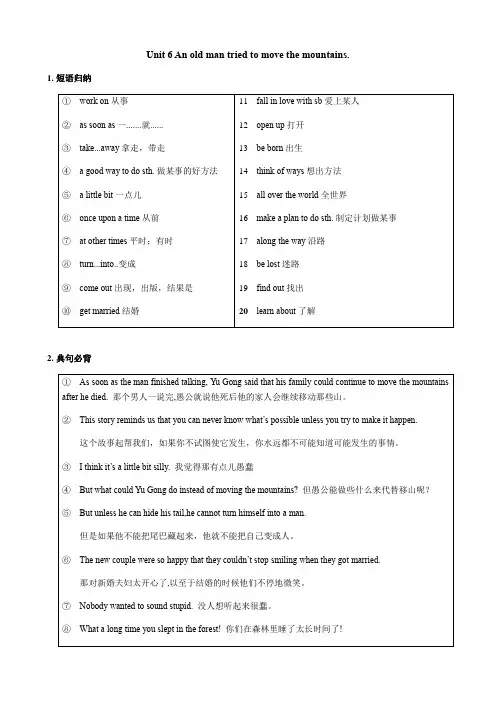
Unit 6 An old man tried to move the mountains.1.短语归纳2.典句必背3.用法集萃(1)As soon as the man finished talking, Yu Gong said that his family could continue to move themountains after he died. 那个男人一说完,愚公就说他死后他的家人会继续移动那些山。
❖as soon as表示“一...就...”,引导时间状语从句。
例:As soon as I went through customs, I jumped in a taxi. 我一过海关就跳上了一-辆计程车。
❖注意:在含as soon as、when等引导的时间状语从句的主从复合句中要遵循“主将从现”的原则,即主句如果用一般将来时,从句要用一般现在时。
(2)This story reminds us that you can never know what’s possible unless you try to make it happen.这个故事起帮我们,如果你不试图使它发生,你水远都不可能知道可能发生的事情。
❖remind作动词,意为“提醒;使想起”。
常见的搭配有:(3)I think it’s a little bit silly. 我觉得那有点儿愚蠢❖ a little bit是固定搭配,意为“有点儿;稍微”,用来修饰形容词或副词。
例:Your bedroom is a little bit dirty. Please clean it up.你的卧室有点儿脏。
请把它打扫干净。
Mike checked the papers a little bit carelessly, so he failed the exam again.迈克在检查试卷的时候有点儿粗心,所以他考试又没有及格。
Unit 4 Why don’t you talk to your parents?1.短语归纳2.典句必背3.用法集萃(1)My parents don't allow me to hang out with my friends. 我的父母不允许我和我的朋友们出去闲逛。
❖allow作动词,意为“允许;准许”。
allow sb. to do sth. 意为“允许某人做某事”,也可以是allow sb. sth.例:His parents won't allow him to stay out late. 他的父母不允许他在外面待到很晚。
Each passenger is allowed 20 kilograms of baggage. 每位旅客准许携带20千克行李。
❖allow sb. to do sth.的被动结构是:“sb. be allowed to do sth.” 某人被允许做某事例:We are allowed to choose our own clothes. 我们被允许选择自己的衣服。
The children are not allowed to play on this lawn. 孩子们不准在这块草地上玩耍。
(2)What’s wrong?怎么了?❖wrong作形容词,意为“有毛病的;错误的”例:There’s something wrong with my bike. 我的自行车出毛病了。
I’m sorry to tell you that your answers are wrong. 我很遗憾地告诉你,你的答案错了。
❖拓展:wrong的延伸(3)I’m really tired because I studied until midnight last night.我真的很累,因为我昨天晚上一直学习到半夜。
❖because是连词,意为“因为”,引导原因状语从句。
八年级下册英语常考知识点一、语法部分。
1. 一般将来时。
结构:will+动词原形或者be going to+动词原形。
比如说“I will go to the park tomorrow.”(我明天将去公园),这里的will表示一种临时的决定。
而“He is going to play football this afternoon.”(他打算今天下午踢足球),be going to更强调计划或者打算。
考试的时候经常会让你根据情景选择用will还是be going to,或者让你用一般将来时来填空呢。
2. 情态动词。
can:表示能力,“I can speak English.”(我会说英语)。
它的否定形式是“can't”,“I can't swim.”(我不会游泳)。
还有表示请求许可,“Can I use your pen?”(我可以用你的笔吗?)could:是can的过去式,除了表示过去的能力,还可以用来表示比“can”更委婉的请求,“Could you pass me the book?”(你能递给我那本书吗?)听起来就比“Can you...”更礼貌哦。
should:表示应该,“You should study hard.”(你应该努力学习)。
如果要表示不应该就是“shouldn't”,“You shouldn't be late for school.”(你不应该上学迟到)。
3. 形容词和副词的比较级和最高级。
比较级的构成:一般情况在形容词或副词后面加 -er,像“tall taller”“fast faster”;以e结尾的加 -r,比如“nice nicer”;以辅音字母加y结尾的,把y变成i再加 -er,像“heavy heavier”。
还有一些特殊的,像“good/well better”“bad/badly worse”。
比较级的用法:用于两者之间的比较,“Tom is taller than Jack.”(汤姆比杰克高)。
Unit1What’sthematter?一、短语归纳1.haveacold感冒2.haveastomachache胃痛3.haveafever发烧4.haveacough咳嗽5.haveatoothache牙痛6.haveaheadache头痛7.haveasoreback背痛=haveabackache8.haveasorethroat喉咙痛9.talktoomuch说得太多10.seeadentist看牙医11.gotoadoctor看医生12.getanX-ray拍X光13.liedown躺下14.liedownandrest躺下休息15.havearest休息16.takeabreak休息=takebreaks17.takeyourtemperature量你的体温18.hurtherself伤到她自己19.cutmyself切到我自己20.cutoff切除cutdown砍到cutup切断cutout删除21.getoff下车22.makeadecision做决定23.tomysurprise令我惊讶的是24.ontheweekend在周末=onweekends25.inthesameway以相同的方式26.withoutthinkingtwice毫不犹豫27.thanksto多亏thanksfor因⋯而感谢(+名词/动词ing)28.intime及时ontime按时29.savealife挽救生命30.getintotrouble陷入麻烦31.rightaway马上32.falldown跌倒33.waitfor等待34.beinterestedindoingsth.对做某事感兴趣35.giveup放弃二、用法集萃1.询问有什么病或有什么麻烦:What’sthematter(withsb.)?2.疾病的表达:have/hasa+疾病名称3.太多:toomuch+不可数名词;toomany+可数名词复数形式太:muchtoo+形容词4. enough足够的:①形容词+enough②enough+名词③itisenough+todosth.5. lie躺下过去式:lay现在分词:lying6.seesb.doingsth.看见某人正在做某事(正在进行)seesb.dosth.看见某人做了某事(看见动作的全过程)7.expecttodosth.期望做某事8.needtodosth.需要做某事9.helpsb.(to)dosth.帮助某人做某事10.tellsb.(not)todosth.告诉某人(不要)做某事11.asksb.todosth.要求某人做某事12.wanttodosth.想要做某事13.agreetodosth同.意做某事disagreetodosth.不同意做某事agreewithsb.同意某人的意见14.trouble问题;麻烦havetrouble/problemdoingsth.做某事有困难15.介词+doing常见的介词有:at;for;with;without;inabout16.be/getusedtodoingsth.习惯于做某事17.keepondoingsth.继续做某事18.minddoingtsh.介意做某事19.反身代词:myself我自己yourself你自己himself他自己herself她自己itself它自己复数:ourselves我们自己yourselves你们自己themselves他们自己20.knife-knives刀名词复数规则变化:①一般情况+s②以e结尾+s③以s、x、ch、sh结尾+es④以辅音字母+y结尾,变y为i+es⑤以o结尾,有生命+es;无生命+s⑥以f/fe结尾,变f/fe为v+es不规则变化:foot-feet脚、足tooth-teeth牙齿man-men男人woman-women女人mouse-mice老鼠21.important重要的importance重要性different不同的difference差异性22.death死亡(名词)die死(动词)dead死的(形容词)三、书面表达Howtokeephealthy如何保持健康Healthisimportant.Everyonewantstobehealthy.Letmetellyouhowtokeephealthy.Firstofall,weshouldeathealthyfood.Weshouldeatmorevegetablesandfruit.Wealson eedtodrinkmilk.Secondly,weshouldexercisealot.Weshoulddosomesportsafterschool.Finally,weshouldhaveenoughsleep.Tohaveagoodrest,weshouldgotobedearlyandgetupearly.Ithinkitisimportantforustokeephealthy.3Unit2I’llhelptocleanupthecityparks.一、短语归纳1. cleanup打扫干净cheerup使兴起来代词放中间2.giveout分发3.handout分发eupwith想出;提出(idea、plan等)5. putoff推迟puton穿衣服putup张贴putaway把⋯收好6.callup打电话;征召edtodosth.曾经做某事beusedtodingsth习.惯于做某事8. lonely孤独的(常用于feel之后)alone独自一人9.carefor照顾=takecareof10.afeelingofsatisfaction一种满足感11.tryout参加⋯选拔12.raisemoney募捐13.fixup修理14.giveaway赠送(money、oldclothes/books等)giveup放弃15.takeafter(外貌或行为)像16.besimilarto与⋯相似17.setup建立18.makeadifference影响;有作用19.disabledpeople残疾人20.makeaplan制定计划21.oldpeople’shome养老院22.helpoutwithsth.帮助解决困难23.abooklover书迷24.attheageof在⋯岁时etrue实现(与dream连用)26.atthesametime同时27.homelesspeople无家可归的人28.beworriedabout为⋯而担心worryabout担心29.forexample例如30.runoutof用完31.not⋯anymore不再32.atonce立刻;马上=rightaway二、用法集萃1.volunteertodosth自愿做某事2. difficult困难的difficulty困难havedifficulty(in)doingsth.做某事有困难3.excited兴奋的(人作主语)exciting使人兴奋的(物作主语)口诀:人+ed物+ing4.疑问词(how,what,where)+todo5. decidetodosth.决定做某事名词形式:decision makeadecision做决定6.learntodosth.学习做某事7.agoodwaytodosth.做某事的好方法8.wouldliketodosth.=wanttodosth.想要做某事9.thankyouforsth./doingsth.因某事/做某事而感谢10.kind善良的kindness善意Unit3Couldyoupleasecleanyourroom?一、短语归纳1.dothedishes清洗餐具2.takeouttherubbish倒垃圾3.foldtheclothes叠衣服foldmy/your/hisclothes4.sweepthefloor扫地5.makethebed铺床makemy/your/hisbed6.cleanthelivingroom打扫客厅7.helpoutwithsth.帮助解决某事8.atleast至少eover过来;顺便来访10.infrontof在⋯前面11.takethedogforawalk遛狗12.allthetime一直13.assoonas一⋯就⋯14.insurprise惊讶地15.hangout闲逛16.dochores做家务17.awasteoftime浪费时间18.inorderto为了19.getgoodgrades取得好成绩20.dependon依靠21.takecareof=carefor=lookafter照顾22.asaresult结果23.fallill生病二、用法集萃1.finishdoingsth.完成做某事2.if如果(主将从现,if后为从句,用一般现在时);是否(位于动词之后)3.assoonas一⋯就⋯.主将从现,assoonas后为从句4.replyangrily生气地回答(副词修饰动词,一般位于动词之后)abeautifuldog一只漂亮的狗(形容词修饰,名词,位于名词前)口诀:形名动副5.beangrywithsb.生某人的气6.as+形容词原级+as和⋯一样7.neitherdidI我也没有neither+be动词/助动词(do/does/did)/情态动词+主语“主语也不⋯..”so+be动词/助动词(do/does/did)/情态动词+主语“主语也⋯”8.can-could可以can,could还可以表示请求,could比can更有礼貌肯定回答:Sure./Ofcourse./Noproblem./Yes,sure.否定回答:No,youcan’t./Sorry,Ican’t.9.asksb.todosth.要求某人做某事10.borrow⋯from⋯跟⋯借(借进来)lend⋯to⋯把⋯借给⋯.(借出去)11.invitesb.todosth.邀请某人做某事12.helpwithsth.helpsb.(to)dotsh.帮助做某事13.havetimetodosth.有时间做某事havenotimetodosth没.时间做某事14.letsb.dosth.让某人做某事15.makesb.dosth.让某人做某事16.spend花费人+spend+时间+onsth/doingsth在某事上花时间/花时间做某事cost花费物+cost+金钱$某物花了多少钱take(took)花费Ittakes/tooksb.+时间+todo.做某事花了某人多少时间payfor付费17.itis+adj(forsb.)+todosth.做某事对某人而言是⋯的18.fair公平的unfair不公平的fairness公平性19.doone’spartindoingsth.尽自己的职责做某事20.the+比较级,the+比较级越...越⋯比较级and比较级越⋯越⋯theearlier⋯thebetter越早越好betterandbetter越来越好Unit4Whydon’tyoutalktoyourparents?一、短语归纳1.talkto/withsb.与某人交谈talkaboutsth.谈论某事2.freetime空闲时间3.allowab.todosth.允许某人做某事allowdoingsth.允许做某事4.hangout闲逛5.getintoafight争吵;打架6.sothat为了;以便于7.lookthrough浏览;快速查看8.workout成功地发展;解决9.getonwith/getalongwith和睦相处municatewithsb.与某人交谈11.abigdeal重要的事petewithsb.与某人竞争13.examskills应试技巧14.cutout删除pare⋯with⋯比较16.not..until直到⋯才17.arguewithsb.与某人争吵18.noproblem没问题19.not..anymore不再20.inmyopinion依我看21.thanksfor因⋯而感谢22.allkindsof各种各样的23.worryabout为⋯而担心=beworriedabout二、用法集萃1.提建议句型:①Youshould/shouldn’t dosth.②How/Whataboutdoingsth.?③Whydon’tyoudosth.?④Whynotdosth.?⑤Shallwedosth.?⑥Let’sdosth.⑦You’dbetterdosth.⑧Wouldyouminddoingsth.?常见回答:Goodidea./Soundsinteresting./I’dliketo./Great.否定:I’dloveto,butIhaveto⋯/Sorry,Ican’t.2.beangrywithsb.生某人的气3. although/though虽然不与but连用4.advice建议(不可数名词)5.refusetodosth.拒绝做某事6.instead代替;反而(位于句首或句尾)insteadof代替(位于句中)7.offertohelp提供帮助8.minddoingsth.介意做某事9.continuetodo/doingath.继续做某事10.keepondoingsth.继续做某事11.afew一些(肯定)few一点点(否定)修饰可数名词复数形式alittle一些(肯定)little一点点(否定)修饰不可数名词做题步骤:先看横线后的名词,判断可数还是不可数;其次,理解句子表达的肯定还是否定12.it’s timeforsth.该做某事了=it’stimetodosth.pete竞争(动词)competition竞争(名词)14.havetimetodosth有.时间做某事Unit5Whatwereyoudoingwhentherainstormcame?一、短语归纳1.gooff闹钟发出响声2.rainheavily下大雨3.pickup接电话;采摘4.atfirst起先5.fallasleep进入梦乡6.diedown逐渐变弱7.havealook看一看8.makeone’sway费力地前进9.insilence沉默10.takedown拆除;往下拽;记录11.atthetimeof⋯当⋯.的时候12.waitfor等待13.atthattime在那时(一般过去时标志词)14.wakeup醒来15.goshopping去购物16.takeashower洗澡17.inamess乱七八糟18.forexample例如19.makesure确保二、用法集萃1.过去进行时定义:表示在过去某一时刻或某一时间段正在进行的动作。
八年级英语下册必背知识点(第一二单元)本文档总结了八年级英语下册第一和第二单元的必背知识点,以帮助同学们更好地理解和记忆相关内容。
第一单元: My day1. 问候与回应- Good morning / afternoon / evening. 早上/下午/晚上好。
- Hi! / Hello! 嗨/你好!- How are you? 你好吗?- I'm fine, thank you. 我很好,谢谢。
- Nice to meet you. 很高兴认识你。
2. 介绍自己- My name is [name]. 我叫[name]。
- I'm [age] years old. 我[age]岁了。
- I'm from [place]. 我来自[地方]。
3. 日常活动- get up 起床- have breakfast 吃早餐- go to school 上学- have lunch 吃午餐- do homework 做作业- have dinner 吃晚餐- go to bed 上床睡觉4. 时间表达- What time is it? 几点了?- It's [time]. 是[时间]。
5. 数字表达- zero 零- one 一- two 二- three 三- four 四- five 五- six 六- seven 七- eight 八- nine 九- ten 十第二单元: School life1. 学科与课程- Chinese 语文- Mathematics 数学- English 英语- Science 科学- Geography 地理- History 历史- Art 艺术- Music 音乐- Physical Education (PE) 体育2. 教室用语- Open your book. 打开你的书。
- Close your book. 关上你的书。
Unit4 Why don’t you talk to your parents?知识点归纳一、重点短语1. have free time有空闲时间2. allow sb. to do sth. 允许某人做某事3. hang out with sb. 与某人闲逛4. after-school classes课外活动课5. get into a fight with sb. 与某人吵架/打架6. until midnight直到半夜7. talk to sb. 与某人交谈8. too many太多9. study too much学得过多10. get enough sleep有足够的睡眠11. write sb. a letter给某人写信12. call sb. up打电话给某人13. surprise sb. 令某人惊讶14. look through翻看15. be angry with sb. 生某人的气16. a big deal重要的事17. work out成功地发展;解决18. get on with与…和睦相处;关系良:19. fight a lot经常吵架/打架20. hang over笼罩21. refuse to do sth. 拒绝做某事22. offer to do sth. 主动提出做某事23. so that以便24. mind sb. doing sth. 介意某人做某事25. all the time一直26. in future今后27. make sb. angry使某人生气28. worry about sth. 担心某事29. copy one’ s homework抄袭某人的作业30. be oneself做自己31. family members32. spend time alone独自消磨时光33. give sb. pressure给某人施压34. have a fight with sb. 与某人吵架35. compete with sb. 与某人竞争36. free time activities业余活动37. get better grades取得更好的成绩38. give one’ s opinion提出某人的观点39. learn exam skills学习应试技巧40. practice sports体育训练41. cause stress造成压力42. cut out删除二、重点句型1. I studied until mid night last night so I did n’t get enough sleep.我昨晚学习到半夜所以睡眠不足。
1 / 17 八年级下册英语知识点归纳 Unit 1 What’s the matter? 一、重点短语 1. have a fever发烧 2. have a cough咳嗽 3. have a toothache牙疼 4. talk too much说得太多 5. drink enough water喝充足的水 6. have a cold受凉;感冒 7. have a stomachache胃疼 8. have a sore back背疼 9. have a sore throat喉咙痛 10. lie down and rest躺下来休息 11. hot tea w ith honey加蜂蜜的热茶 12. see a dentist看牙医 13. get an X-ray拍X光片 14. take one’ s temperature 量体温 15. put some medicine on sth.在……上面敷药 16. feel very hot感到很热 17. sound like听起来像 18. all weekend整个周末 2 / 17
19. in the same way以同样的方式 20. go to a doctor看医生 21. go along沿着……走 22. on the side of the road在马路边 23. shout for help大声呼救 24. without th inking twice没有多想 25. get off下车 26. have a heart problem有心脏病 27. to one’ s surprise 使....... [京讶的 28. thanks to多亏了;因为 29. in time即时 30. save a life挽救生命 31. get into trouble造成麻烦 32. right away立刻;马上 33. because of因为 34. get out of离开;从……出萍 35. hurt oneself受伤 36. put a bandage on sth.用绷带包扎 37. fa ll down摔倒 38. feel sick感到恶心 39. have a nosebleed流鼻血 3 / 17
40. cut his knee割伤他的膝盖 41. put her head back把她的头向后仰 42. have problems breathing呼吸困难 43. mountain climbing登山运动 44. be used to doing sth.习惯做某事 45. run out (of)用完;用尽 46. so that以便 47. so. . . that如此… …以至于… 48. be in control of掌管;管理 49. in a d iffic u lt situation在闲境屮 50. keep on doing sth.继续或坚持做某事 51. make a decision做出决定 52. take risks冒险 53. give up放弃 二、重点句型 1. What’ s the matter? What’ s the matter with you? = What’s the trouble with you? = What’ s wrong with you? 你怎么了? 2. W hat should she do? 4 / 17
她该怎么办呢? Should I take my temperature? 我应该量一下体温吗? 主语+ should/shouldn’t + 动词原形. .. ①You should lie down and rest. 你应该躺下休息一会儿。 ② You shouldn’ t go out at night. 你晚上不应该出去。 3. Do you think it comes from a newspaper or a book? 你认为它是来自报纸还是书呢? 4. I think I sat in the same way for too long withoutmoving. 我想我以同样的姿势一动不动地坐得太久了。 5. She said that the man had a heart problem andshould goto the hospital Unit 2 I ’ll help to clean up the city parks. 一、重点短语 1. Clean-Up Day清洁日 2. an old people’s home 养老院 3. help out with sth.协助解决困难 4. used to以前… … ;过去_ 5. care for关心;照顾 5 / 17
6. the look of joy快乐的表情 7. at the age of在......岁时 8clean up打扫(或清除)干净 9. cheer up (使)变得更高兴;振雀 10. give out分发;散发 11. come up w ith想出;提出 12. make a plan制订计划 13. make some notices做些公告牌 14. try out试用;试行 15. work for为…工作;为…. 效力 16. put up建造;举起;张贴 17. hand out分发;散发;发给 18. call up打电话;召集 19. put off推迟;延迟 20. for example比如;例如 21. raise money筹钱;募捐 22. take after与......相像;像 23. give away赠送;捐赠 24. fix up修理;修补;解决 25. be similar to与……相似 26. set up建立;设立 6 / 17
27. disabled people残疾人 28. make a difference影响;有作用 29. be able to能够 30. after-school reading program 课外阅读项目 二、重点句型 1. The boy could give out food at the food bank.这个男孩能够在食品救济站分发食物。
2. Clean-Up Day is only two weeks from now. 清洁日离现在仅仅两周的时间。 3. He volunteers at an animal hospital every Saturdaymorning. 每周六上午,他都在一'家动物医院当志愿者。 4. Last year, she decided to try out for a volunteerafter-school reading program. 去年,她决定去参加一个课外阅读项目的志愿者 的选拔。5. . . . you can see in th e ir eyes that th e y? regoing on a different journey w ith each new book. ……从他们的眼睛里你能够看到他们正在实行每 本不同的新书之旅。 6. I want to put off my plan to w o rk in an animal hospital u n til next summer. 我想把我在动物医院工作的计划推迟到明年夏天。 7. Most people today are only worried about gettinggood jobs to make lots of money. 7 / 17
现在的绝大部分人仅仅为找一份能挣很多钱的好工 作而着急。 8. You helped to make it possible for me to haveLucky. 在你的协助下,我才有可能拥有“幸运儿”。 Unit 3 Could you please clean your room? 重点短语 go out for dinner出去吃饭 stay out late在外面待到很晚 go to the movies去看电影 get a ride搭车 work on从事 finish doing sth.完成做某事 clean and tid y干净整洁 do the dishes洗餐具 take out the rubbish倒垃圾 fold your/the clothes叠衣服 sweep the floor扫地 make your/the bed整理床铺 clean the livng room打扫客厅 no problem没问题 welcome sb.欢迎某人 8 / 17
come home fro m school/ work放学/下班回家 throw down扔下新课标第一网 sit down坐下 come over过来 take sb. for a walk带某人去散步 all the time一直;总是 all day/evening整曰/夜 do housew ork做家务 shout back大声回应 walk away走开 .share the housework分担家务 a com fortable home一个舒适的家 in surprise惊讶地 get som ething to drin k拿点喝的东西 watch one show观看一个节目 hang out闲逛 pass sb. sth.把某物传给某人 lend sb. sth.把某物借给某人 get sth. wet使某物弄湿 hate to do sth.讨厌做某事 do chores做杂务